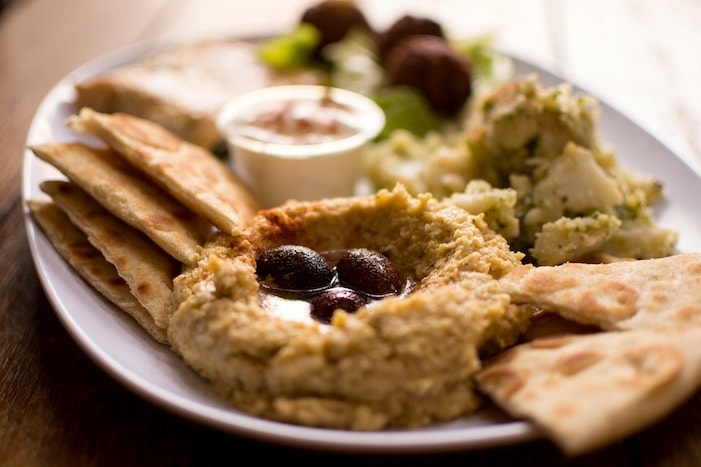7 Mediterranean Cooking Tips for Healthier, Happier Holiday Meals

With a few simple tweaks to your festive dinners, you can incorporate the flavors of the Mediterranean diet while reaping its health benefits—without making major changes to your menu.
1. Serve Mediterranean Dips.
Instead of heavy cheese dips rich in saturated fats start with some equally delicious Mediterranean dips. The yogurt based garlic dip tzatziki, the creamy split pea fava and the tasty Lentil Dip with Tahini and Lemon make ideal choices. All three of these easy recipes are rich in antioxidants and the good fats and they can be made the day before. Accompany them with some thin breadsticks and if you can find them, barley rusks (paximadi) or you can make them by following this recipe: Authentic Greek Barley Rusks
2. Cook with Olive Oil and Greek Yogurt.
Use olive oil and Greek style yogurt for your cooking. When making mashed (regular or sweet) potatoes use olive oil and Greek style yogurt instead of butter and cream. It will make for a lighter side dish but also a healthier one without sacrificing taste. Olive oil also can be used for roasting and cooking as well. An easy and tasteful way to serve seasonal vegetables such as cauliflower and broccoli is by simply placing them in a pan, adding olive oil and garlic and roasting them for 30 minutes at 400 degrees Fahrenheit.
Try these recipes:
Mediterranean Style Roasted Broccoli
Roasted Cauliflower with Cheese and Garlic
3. Add a large salad.
While there are plenty of side dishes during holiday dinners, most of them cooked and starchy. Add a large salad using seasonal vegetables for a fresh taste. Salads with ingredients such as cabbage, carrots, spinach, nuts and dried fruit topped with an olive oil based dressing make an ideal accompaniment to the rest of the “heavier” dishes.
Here are some favorites:
Mediterranean Red Cabbage and Chickpea Salad
Roasted Brussels Sprouts and Butternut Squash Salad
Classic Cabbage and Carrot Greek Salad
Festive Winter Mediterranean Salad
4. Try Greek style casseroles.
Instead of the traditional green bean casserole try making a Greek style one. Cook on the stovetop green beans with tomato sauce and herbs. You can also do the same for peas. Not only is it a delicious way to eat vegetables, it provides a dose of extra antioxidants from the tomato and olive oil.
5. Make some olive oil based desserts.
Olive oil is traditionally used for desserts in the Greek kitchen. While these do not necessarily have fewer calories than a sweet made with butter, they do contain the healthy monounsaturated fats from the olive oil. Try this Authentic Lemon Olive Oil Cake or the traditional Greek Honey Dipped Cookies melomakarona or a Hearty Apple Olive Oil Cake instead of an apple pie. And one of my favorites: Vegan Baklava Rolls, they are delicious!
6. Add fruit to your list of desserts.
Alongside the wonderful pies and cakes serve a platter of seasonal cut fruit such as apple, pear and orange. In another bowl or dish serve a variety of dried fruit; figs, apricots, prunes and raisins are nutritious choices. Yes, people will enjoy the tasty cookies and cakes, but fresh fruit will provide a much needed break and some extra vitamins and fiber.
7. Serve Herbal Tea.
Accompany your desserts with some herbal teas such as chamomile, thyme, mint or mountain tea (tsai tou vounou). It will help bring some relief after overeating for your guests while providing beneficial antioxidants through the herbs.

Hi Elena.
I bought your book. I love it!!!!
Please put out another one. There are so many wonderful recipes, can’t keep track of them all.
You have changed my life. I feel healthier and stronger.
Thank you so much
Suzanne
Thank you for sharing Suzanne! It makes me happy to hear that you are feeling stronger and healthier!
Thank you Elena.
Hi Elena … can you pls tell me what the platter above is made up of … looks very healthy and delicious … thank you so much
Hi Mary. Hummus, pita bread, potato salad
I would like to try some mountain tea! Sounds interesting… And I’ve never tried it before.
It is called Tsai tou vounou. I like having it in the evening as well with a small snack such as olives, cheese and bread and it contains beneficial antioxidants.
Elena,
Thanks for doing your part to broadcast how healthy and nutritious the Greek cuisine is. We just had Greek Dinner Jan 15th last night all over the world. We are starting a movement in bringing people around the Greek dinner table.
Keep up the good work.
Irene
Thanks Irene! Drop me an email, you can find my contact info under “CONTACT”. Good luck with your site!
Great post,Elena! Coming back to read more! I write about the Mediterranean/Greek Way of Life in my book, Sailing to Ithaca: A Year’s Journey, Nurturing Body and Soul. Glad to see how we agree on this topic. 🙂
Thanks Katina! Yes we agree, and luckily so does the scientific community. Good Luck with the book!